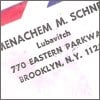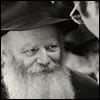While newly discovered letters written by the Rebbe, Rabbi Menachem Mendel Schneerson, of righteous memory, shed light on how he viewed people with special needs, the reams of his previously published personal correspondence reveal a profound care for every individual who approached him with questions and problems. The following article, which was written by Jonathan Mark of The Jewish Week shortly after the Rebbe's passing in 1994, pays tribute to the breadth and depth of the Rebbe's scholarship as reflected in his letters to a swath of humanity.
The Jewish Week - July 8, 1994
Some previously unpublished correspondence of the Rebbe provides a rare glimpse into his substance and style.
As the personal papers and letters of the late Lubavitcher Rebbe come to light, a portrait is emerging of a leader who was more of a pluralist than he has been credited for, who was able to maintain a cordiality with ideological opponents, who corresponded and advised Israeli prime ministers and fund raisers for UJA-Federation, extending encouragement and endorsements even as he offered serious critiques.
The Jewish Week has obtained a sampling of Rabbi Menachem Mendel Schneerson's letters from as far back as the 1950's on a wide range of issues, some of which have never been printed in English.
Although the previous two Lubavitcher Rebbes were fierce opponents of political Zionism, there is a letter from 1959 in which the Rebbe responds with great respect to "His Excellency, Mr. David Ben-Gurion, Prime Minister of Israel."
The Rebbe, who modified the Lubavitch stance from anti-Zionist to non-Zionist, maintained a warm correspondence with Ben-Gurion, even when having one early exchange about the "Who is a Jew" debate that exploded some 30 years later.
Many critics were to condemn the Rebbe for being divisive for his adherence to traditional Jewish law on the "Who is a Jew" matter.
But the Rebbe wrote to Ben-Gurion, "All our brethren, wherever they may be, have constituted one people, from the moment of their emergence, in spite of their dispersion in all corners of the world.
Consequently, the solution of the problem must be one that is acceptable to all members of the Jewish people everywhere, that is capable of forging and strengthening the bonds of unity [among] all Jews. Certainly not one that would be cause, even the remotest, of disunity and dissention."
The Rebbe concluded "with the hope and expectation that Eretz Israel in all aspects, both present and future, should constitute a factor uniting Jews everywhere, both Orthodox and non-Orthodox of all trends," exemplifying "the name by which it is known among all the people of the world - 'the Holy Land.'
Yours truly, M.M.S."
Few thought the Rebbe to be a pluralist, but in a 5740 (1980) letter to the chairs of the South African Zionist Federation and Jewish Board of Deputies, the Rebbe stated: "Virtually every Jewish community... comprises a variety of groups, each with a distinct identity in terms of ancestral heritage and traditions, as exemplified in different synagogues, with different rites and customs, such as Ashkenaz, Sephardic, Yemenite, etc. All of them existing and flourishing side by side contribute to the advancement of the Jewish community as a whole ... You surely know that the [Torah sages] in all generations scrupulously upheld the validity of tradition in regard to the nusach of tefillah [the differing order, wording and manner of the prayer canon], tracing its variety to the original Twelve Tribes of Israel. ...Experience has shown that whenever a uniform educational system has been imposed on a multi-faceted community, it inevitably proved disastrous.
In a letter written in the winter of 5741 (1981), the Rebbe tells Rabbi Isaac Trainin, then-director of religious affairs for the Federation of Jewish Philanthropies, that he once consented to a press release "in which I endorsed the U.J.A.-Federation Campaign some years ago, and suggest that a similar endorsement at this time would be most helpful."
The Rebbe went on to explain that the previous Rebbe established a policy of making "no public endorsements of any cause, however worthy," other than those connected to Lubavitch.
However, the Rebbe admitted that he had "a further motive.
...I need hardly to explain to you that the funds which the Federation has allocated for Jewish education are quite disproportionate to its total budget."
The Rebbe cited the needs not only of yeshivos and day schools, but of programs to stem the tide of alienation, intermarriage and assimilation - programs which in 1994 are now at the heart of UJA-Federation's "Jewish continuity" campaign.
The Rebbe offered the following endorsement of UJA Federations campaign:
"In view of the growing needs of our Jewish brethren, both here and overseas, particularly in the area of Jewish education, I earnestly trust that everyone who is approached for a contribution to this campaign will respond warmly and generously. To counteract the growing forces of assimilation, cults, intermarriage, etc. that are seriously eroding the very foundations of American and world Jewry."
Rabbi Trainin told the Jewish Week that the endorsement was used and disseminated within the Orthodox community.
The Rabbi said that one late Sunday night he brought the then- Federation president Lawrence Buttenweiser to see the Rebbe at Lubavitch headquarters, 770 Eastern Parkway, even as actress Shelly Winters was in the anteroom awaiting her own counseling session with the Rebbe.
The Rebbe, recalls Rabbi Trainin, spoke to Buttenweiser about the need for more funding for education. Buttenweiser, says Rabbi Trainin, told the Rebbe, " 'we are meeting the challenge but it will take time for further support.' "
The Rebbe looked at him and said: 'Our children can't wait.' "
"Mr. Buttenweiser started to cry, ' said Rabbi Trainin. "We're not talking about a chasid, you know. He was a totally secular Jew."
A 1968 letter to one Jewish author reveals that the Rebbe had a softer approach to outreach than even some of his followers. Enclosed in the letter was a pair of tefillin.
"I'm not sure," wrote the Rebbe, "that you will consider it a pleasant surprise. Nevertheless, I trust you will accept it in the spirit in which it is proffered. ...I need hardly add that there is no intention on my part, G‑d forbid, to intrude upon your personal affairs. But I do believe that the gesture eminently accords with your weltanschauung [worldview], particularly in relation to the unity of the world and community interests, especially insofar as the Jewish people are concerned, not to mention the bond existing between friends who have met and exchanged views ... With esteem and blessings,"
Signed, "Menachem Mendel Schneerson."







Start a Discussion